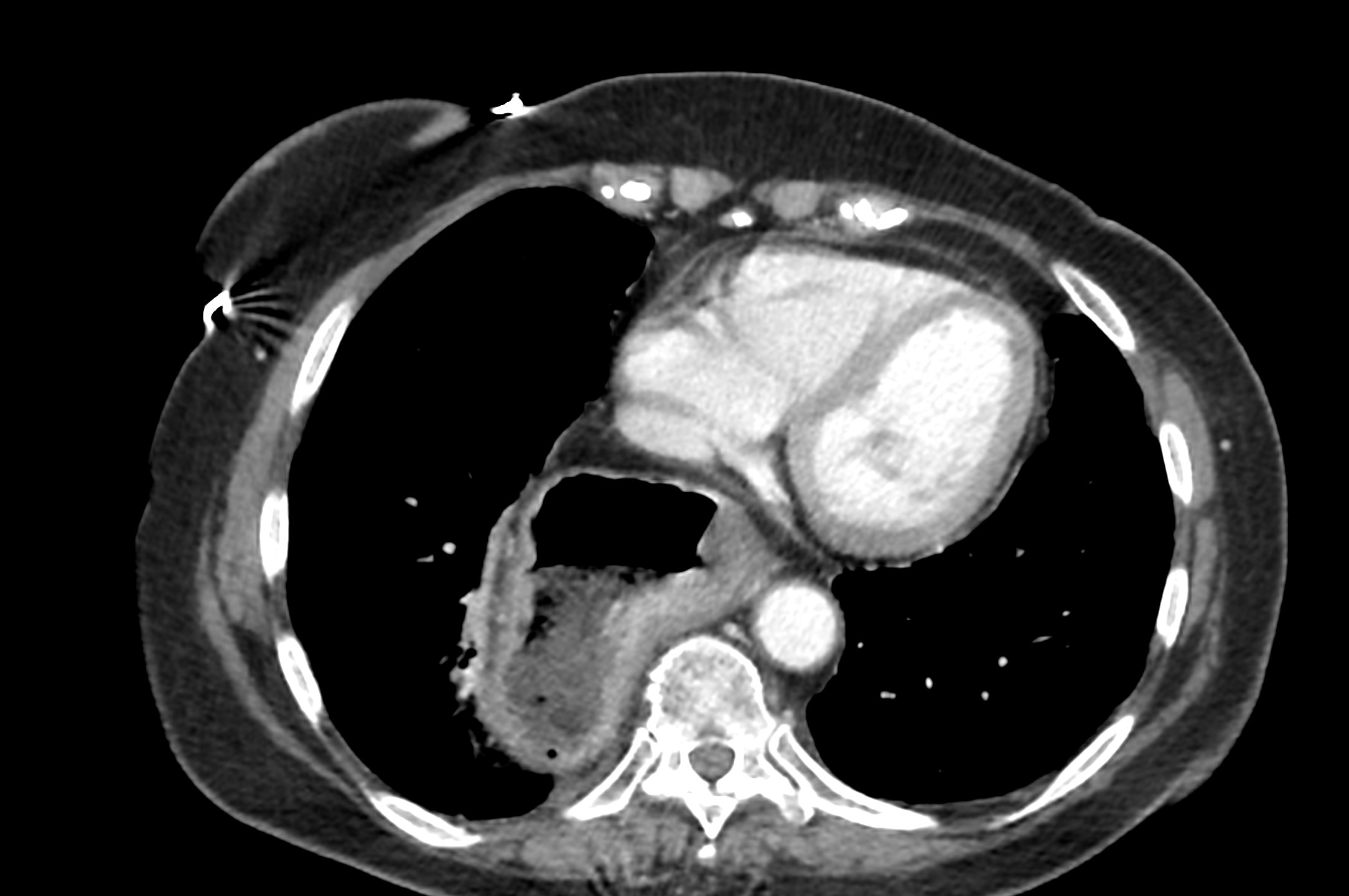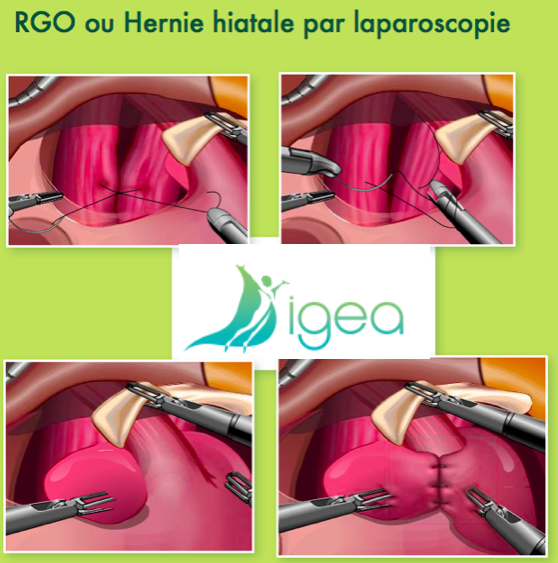Surgery for gastro-oesophageal reflux disease

Definition
When you suffer from gastro-oesophageal reflux disease (GORD), the acid contained in the stomach refluxes or rises from the stomach to the oesophagus.
This causes irritation and inflammation (oesophagitis).
Symptoms :
- Reflux is described as a sensation of intense burning. This sensation is felt between the ribs, or just beneath the neck, but it may spread throughout the chest, to the throat and the neck.
- You have difficulty swallowing.
- A chronic cough.
- Wheezing.
Causes
When you eat, food goes from your mouth to you stomach though a tube called the oesophagus. The lowest part of the oesophagus is made up of a muscle in the shape of a ring called the « lower oesophageal sphincter » (LOS) which functions like a one-way valve.
Normally, the LOS closes immediately after food has passed through it to make sure the liquids contained in the stomach do not go back up into the oesophagus (as they have a high acidity level).
GORD happens when the LOS does not do its job correctly and allows the acidic liquids in the stomach to flow back into the lower oesophagus which creates the sensation of intense burning.
The result is irritation and inflammation of the oesophagus, which causes burning in the stomach and can eventually damage the oesophagus.
Factors which might cause the ineffectiveness of the LOS:
- Certain types of medicines.
- Clothing worn too tight.
- Smoking.
- Consuming alcohol.
- Intense exercise.
- Changing posture (leaning forwards or lying on your back).
Hiatus hernia : A large number of patients who suffer from GORD may develop a hiatus hernia which does not necessarily develop the symptoms of oesophagitis.
Signs and Symptoms
- A sensation of burning in the chest which gets worse if you lean forward.
- Pain when you swallow.
- Coughing at night due to bronchial irritation caused by the reflux of acid when you are lying down.
- Frequent irritation of the throat, requiring a visit to an ENT specialist.
- Anaemia, feeling weak and pale, due to internal bleeding provoked by the hiatus hernia.

scannographic of a hiatus hernia
Treatment
Normally the treatment takes place in three successive stages:
- Lifestyle change:
- For the majority of people, changing their eating habits and taking antacids will reduce the frequency and intensity of their symptoms. Losing weight, reducing or stopping smoking and drinking alcohol, changing eating habits and the quality of sleep, also helps to combat GORD.
- Taking medicines:
- When symptoms persist, taking medicines might be necessary. Antacids neutralise the acid contained in the stomach, and over-the-counter medicines reduce the quantity of acid produced. Although both types of medicine can alleviate the symptoms, prescription medicines can be more efficient in getting rid of the irritation of the oesophagus, and soothing the other symptoms. Medicinal therapy should be discussed with your surgeon.
- Surgery:
- What you can expect if you decide to undergo anti-reflux surgery by laparoscopy/keyhole surgery.
People who change their lifestyle, or take medicines, without the desired result, or those who constantly need medicines to alleviate their symptoms, must either come to terms with living with their problem, or undergo surgery. - Surgery is a very efficient treatment for GORD for patients who respond well to medical treatment by proton pump inhibitors – PPI(s).
- Discuss these options with your surgeon and your GP/Family doctor, to determine if you are a candidate for one of them.
- What you can expect if you decide to undergo anti-reflux surgery by laparoscopy/keyhole surgery.
Laparoscopy/Keyhole surgery
The advantages of laparoscopy/keyhole surgery are generally as follows:
- A Nissen Fundoplicature is total at 360° (Laparoscopic floppy Nissen).
- Less post-operative pain.
- Shorter stay at the clinic.
- Shorter period before returning to work.
- Better aesthetic results.
Indications for the treatment of reflux by laparoscopy/keyhole surgery:
Although anti-reflux surgery by laparoscopy/keyhole surgery has numerous advantages, this type of treatment is not appropriate for all patients.
Indications:
- Patients who regurgitate a lot.
- Persistent users of PPI(s), whose pyrosis (heartburn) has disappeared.
- Patients with symptoms typical of reflux.
- Under 50 years old.
- Complete disappearance of symptoms with antisecretory treatment.
A complete medical evaluation by a surgeon who is specialised in anti-flux surgery by laparoscopy/keyhole surgery, after consultation with your GP/Family doctor and your gastroenterologist, is necessary to determine if such surgical treatment is the best choice for you.
After having discussed the possible risks and benefits of the operation with your surgeon, you must complete a consent form.

Results of the Surgery
Immediate results on symptoms = excellent in 90% of cases
Rate of conversion < 2%
Mortality rate not zero but less than 0.8%
Morbidity ~ 5%
Secondary effects after reflux surgery
Either the appearance of new symptoms:
- Dysphagia (difficulty swallowing) 5% of surgical reinterventions (9.6% after Nissen, 1.6% after Toupet).
- Gas bloat syndrome.
- Early satiety.
- Diarrhoea.
Or the aggravation of pre-existing symptoms:
- Aerophagia.
- Bloating.
- Sluggishness.
Riferimenti bibliografici
- Reference 1 : Test1
- Reference 2 : Test
- Reference 3 : Test
- Reference 4 : Test
- Reference 5 : Test
- Reference 6 : Test
- Reference 7 : Test
- Reference 8 : Test
- Reference 9 : Test


